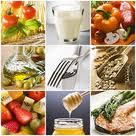Importance of Six Tastes in Ayurvedic Diet :
Ayurveda identifies six tastes that should be included in your daily diet. These six tastes are:
| Sweet |
Sugar, honey, rice, pasta, milk,
etc. |
| Sour |
Lemons, hard cheese, yogurt,
vinegar, etc. |
| Salty |
Salt, any salty food. |
| Pungent |
Chili peppers, cayenne, ginger, any hot spice. |
| Bitter |
Leafy greens, turmeric, lettuce,
etc. |
| Astringent |
Pomegranate, beans, lentils, etc. |
These six tastes are listed in the order they are digested in your body. Sweet gets digested first, so it's not a good idea to have a dessert at the end of the meal. Salad should be taken at the end of the meal. Cravings are often caused by not having all of the six tastes in your daily diet. Many people often omit the bitter and astringent tastes. When you have something bitter or astringent at the end of a meal, it reduces your desire for sweets.
Natural Sources Of Essential Vitamins And Minerals:
1. Natural sources of Vitamin A:
Carrots
Sweet Potato
Kale
Spinach
Butter
Broccoli
Winter squash
Romaine lettuce
Mango
Watermelon
Papaya
Guava
2. Natural sources of Vitamin B1 (Thiamine):
Asparagus (Shatavari)
Cabbage
Spinach
Ground flaxseed
Sunflower seeds
Sesame Seeds
Green Peas
Nuts
Beans
Barley
Cucumber
Cumin
Watermelon
3. Natural sources of Vitamin B2 (Riboflavin):
Spinach
Milk
Almonds
Sun-dried tomatoes
Corn Flakes
Cottage Cheese
Beans
Asparagus (Shatavari)
Bananas
Fenugreek (Methi)
4. Natural sources of Vitamin B3 (Niacin Foods):
Peanuts
Sunflower seeds
Avocado
Cheese
Broccoli
Asparagus
Coffee
Kidney Beans
Bell Peppers
5. Natural sources of Vitamin B6 (Pyridoxine):
Pinto Beans
Avocado
Sunflower Seeds
Sesame Seeds
Milk
Carrots
Spinach
Sweet potato
Green peas
Bananas
6. Natural sources of Vitamin B12:
Low-fat Milk
Yogurt
Cottage Cheese
Fortified Cereals
7. Natural sources of Vitamin C:
Papaya
Kiwi
Bell Pepper
Guava
Broccoli
Cauliflower
Tomato
Orange
Pineapple
Mango
8. Natural sources of Vitamin E:
Bell Peppers
Peanut Butter
Dried Apricots
Hazelnuts
Spinach
Avocado
Sunflower seeds
Almonds
Olive oil
Sweet Potato
Kiwifruit
Red Sweet Pepper
Almond Oil
Pumpkin Seeds
9. Natural sources of Calcium:
Milk
Cheese
Green leafy vegetables like - Broccoli, Cabbage and Okra.
Soya & White Beans
Dried Figs
Almonds
Oranges
Brazil Nuts
Sesame Seeds
Yogurt
Beans & Lentils
Sunflower Seeds
Baby Carrots
Celery
10. Natural sources of Potassium:
Avocado
Pomegranate
Banana
Watermelon
Dried Apricots
Spinach
White & Black Beans
Coconut water
Sweet Potato
Yogurt
11. Natural sources of Iron:
Dark Chocolate
Spinach
Lentils
Black Beans
White Rice
Kidney Beans
Tomatoes
Chickpeas
Dried Apricots
Seeds like: Pumpkin, Sesame and Flax
Coconut Milk
Broccoli
12. Natural sources of Magnesium :
Almonds
Cashews
Spinach
Edamame
Peanuts
Whole Wheat
Sesame Seeds
Black Beans
Avocado
Yogurt
Banana
Pumpkin seeds
Figs
13. Natural sources of Zinc :
Pumpkin Seeds
Chickpeas
Cashews
Spinach
Dark Chocolate
Sesame & Watermelon Seeds
Wheat Germ
Cereals
Garlic
Kidney Beans
Walnuts
|


